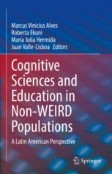Search
Search Results
-
Cognitive Biases in Criminal Case Evaluation: A Review of the Research
Psychological heuristics are an adaptive part of human cognition, hel** us operate efficiently in a world full of complex stimuli. However, these...

-
The relationship between adverse childhood experiences and social anxiety disorder symptoms: the mediating role of rumination
This study aimed to examine the mediating role of rumination in the relationship between adverse childhood experiences and social anxiety disorder...

-
Health, psychosocial and cognitive factors associated with anxiety symptoms
Anxiety disorders are the most prevalent psychological conditions among adults worldwide. However, further research is needed on the role of...

-
Panic Disorder PD and Agoraphobia: Etiological, Cognitive, and Neuroscientific Aspects
Panic attacks are prevalent; almost one in three people will experience a panic attack in their lifetime. The occurrence of a panic attack is not...
-
Child Cognitive Development in Latin American Rural Poverty: What Should Researchers Consider for Conducting Fieldwork?
There is an enormous corpus of literature dissecting the effects of poverty on child cognitive development. Nonetheless, almost all of it has made...
-
Explainable Multilayer Perceptron Classification Model for Detecting the Internalized Shame-Based on Childhood Trauma, Social-Emotional Competence, Cognitive Flexibility, Distress Tolerance, Alexithymia, and Age
Internalized shame is a degrading emotional experience that is associated with avoidance tendencies, negative self-esteem, and feelings of...
-
Cognitive appraisal, Co**, Stress and Fear Contracting Covid-19 in Working People in Pakistan
The present study aimed to examine the relationship and prediction of cognitive appraisal and co** with Stress and Fear contracting COVID-19 among...

-
Investigating the Impact of Peer-Trainer Delivered Mindfulness Training on Cognitive Abilities and Psychological Health
ObjectivesMindfulness training (MT) has emerged as a promising tool to promote cognitive functioning and psychological health. As a result, demand...

-
Older Women in India: Differential Vulnerabilities and Empowerment Interventions
Population aging is considered as a mark of success of human civilization achieved through medical advancement and public health initiatives...
-
Post-traumatic Stress Disorder in School-age Children: A Nationwide Prospective Birth Cohort Study
Traumatic childhood events are some of the few identifiable and to some extent preventable causes of psychiatric illness. Children exposed to...

-
Validating the Diathesis–Stress Model Based Case Conceptualization Procedure in Cognitive Behavioral Therapies: The LIBET (Life Themes and Semi-Adaptive Plans—Implications of Biased Beliefs, Elicitation and Treatment) Procedure
Cognitive behavioral therapy (CBT) approaches use case formulation procedures based on the diathesis–stress conceptualization model, arranged in two...

-
Investigating mindfulness influences on cognitive function: On the promise and potential of converging research strategies
Research investigating the effects and underlying mechanisms of mindfulness on cognitive functioning has accelerated exponentially over the past two...

-
The KOALA-study: study protocol for a comprehensive study of cognitive biases in adolescent anorexia nervosa patients compared to healthy and clinical controls
BackgroundAnorexia nervosa (AN) is characterized by dysfunctional cognitions including cognitive biases at various levels of information processing....

-
Dialogues: Similarities and Differences Between the Psychodynamic Therapy and Cognitive-Behavioural Approaches Regarding Case Conceptualization and Treatment of Anxiety
Psychoanalytic and later psychodynamic traditions (PD) historically preceded behavioural and cognitive-behavioural approaches (CBT). Similarly,...
-
Mindfulness and anxiety among university students: Moderating role of cognitive emotion regulation
University students have to face many challenges including different social and educational settings, these changes can negatively affect their...

-
Keep me updated! Social support as a co** strategy to reduce the perceived threat caused by the cognitive availability of COVID-19 relevant information
The enormous amount of information about the COVID-19 pandemic in newspapers, TV channels, or social media reminds people every day of the potential...

-
Social Anxiety Disorder (SAD): Etiological, Cognitive, and Neuroscientific Aspects
Social anxiety disorder (SAD) is characterized by an intense fear of social situations in which the person might be rejected, embarrassed,...
-
A Biobehavioural Approach to Understand How Mindfulness-Based Cognitive Therapy Reduces Dispositional Negative Self-Bias in Recurrent Depression
ObjectivesIn order to address an important gap in understanding mechanisms of depressive relapse, we complemented self-report with...

-
Cardiac Vagal Control Among Community Cigarette Smokers with Low to Moderate Depressive Symptoms
Impairments in cardiac vagal control (CVC) have been independently linked to smoking status and depression and are implicated in self-regulatory...
-
Digital Media Use Preference Indirectly Relates to Adolescent Social Anxiety Symptoms Through Delta-Beta Coupling
Adolescence is a period of profound biological and social-emotional development during which social anxiety symptoms commonly emerge. Over the past...

